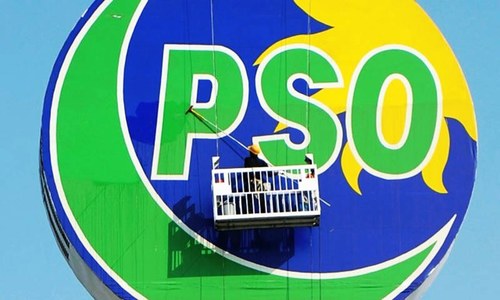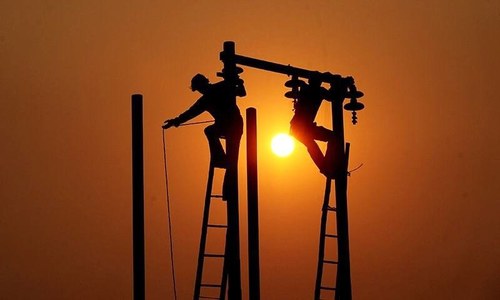ISLAMABAD: Amid government claims of controlling energy shortages and improving recoveries, a staggering Rs250 billion has been added to the outstanding dues of the Pakistan State Oil (PSO) since June 2013.
This is the highest amount of receivables in the accounts of the country’s largest fuel supplier that had peaked at Rs220bn in May 2013 before the government cleared the amount through a controversial scheme of cash payments and book adjustments.
The PSO’s management has repeatedly written to the ministries of water and power, petroleum and finance about its difficult financial position in recent weeks and sought proactive support.
On Friday, it reported to the government that its total receivables on Dec 1 had gone beyond Rs250bn.
This comes at a time when the ministry of water and power reported last week to parliament that circular debt stood at Rs321bn in June after an addition of Rs47bn in the fiscal year 2015 alone. This was in addition to the backlog of about Rs335bn parked in the Power Holding Company (PHCL) and now being financed through debt servicing surcharge as part of the consumer tariff.
The government did not pass on two consecutive reductions in consumer tariff determined by the power regulator for fiscal years 2015 and 2016 as it facilitated the 10 distribution companies to seek stay orders from the Islamabad High Court. The power sector receivables had posted a 66pc increase in receivables despite 27 per cent cut in generation cost, better energy mix and purported improved governance.
“No payment has been made during the first quarter of 2016-17 against late payment surcharge,” complained the company in a letter to the secretary, ministry of water and power, reminding him that a commitment was made in his presence to clear Rs3bn against first quarter LPS to meet interest payments to banks on overdraft.
In a report submitted to the ministry of finance on Friday, the company said most of its receivables emanated from non-payment by or because of public sector. For example, an amount of Rs185bn was directly payable by government entities — Rs134bn by generation companies, Rs14.2bn by Pakistan International Airlines and Rs10bn by the government as price differential claims and Rs20.5bn by Kot Addu Power Company (Kapco).
Mainly because of government-owned power companies, the dues of private companies, the Hub Power Company for instance, have now risen to Rs64bn. On top of that, about Rs7.1bn dues have piled up against the Sui Northern Gas Pipelines Limited (SNGPL) on account of imported liquefied natural gas.
The PSO also reported that about 88pc of its total dues (Rs219.3bn) were held up with the usual power sector. Mainly because of these receivables, PSO’s outstanding international and local liabilities stand at Rs60bn, including payments to be made to Qatar and Kuwait for LNG and fuel supplies.
This was also in line with the receivables of the power sector itself. At the conclusion of last fiscal year ending June 30, the power sector receivables had gone beyond a record Rs684bn mark, according to final consolidated accounts of the public sector power companies.
The power sector payables also increased by 44pc to Rs300bn as of June 30 from Rs207bn three years ago despite a payment of Rs480bn by the government out of public money to power producers and fuel suppliers.
In a consolidated Financial Review 2015-16 of the power sector provided to the Prime Minister’s Office, the Pakistan Electric Power Company (Pepco) — an umbrella of all distribution, transmission and generation companies — reported improvement in recovery rate to 94.4pc against billed amounts of 2015-16 compared with 89.2pc of the same period last year.
Also, it reported decline in overall system losses to 17.9pc in June this year, from 18.7 pc last year.
Pepco said total payables peaked at Rs461bn by the end of 2012 before the government picked up circular debt of Rs480 in June and July 2013. It dropped to Rs207.2bn as a consequence of this settlement criticised by the opposition parties for being in violation of mandatory pre-audit statutory requirement.
The report said the power sector receivables have maintained an upward journey since 2011 when it stood at Rs286bn. These outstanding amounts against various consumers stood at Rs411bn as of June 30, 2013 — soon after the PML-N came to power — and then kept on increasing albeit at a slowing pace. For example, the receivables reached Rs513bn by the end of June 2014, up 25pc, followed by 23pc increase to Rs633bn in 2015 to settle down at Rs684.06bn at end-June this year, up 8pc.
Ironically, the outstanding bills against the private sector more than doubled to Rs423bn in June this year from Rs197bn in 2012 despite the fact that power supply to common consumers is disconnected after 35 days of non-payment. (ENDS)
Published in Dawn December 3rd, 2016













































